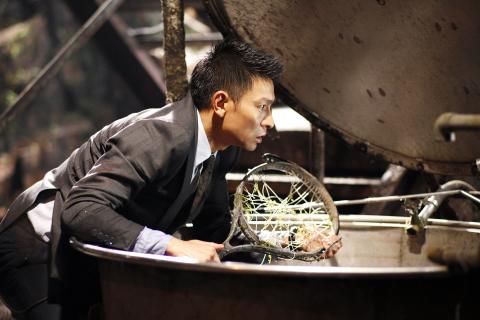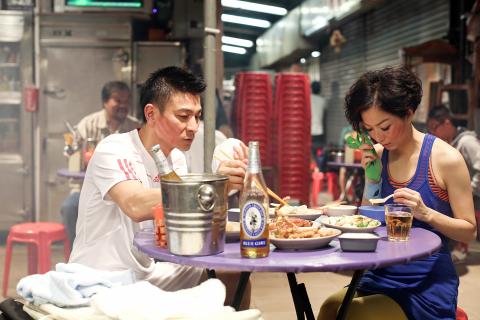Prolific Hong Kong auteur Johnnie To (杜琪峰) reunites with super stars Andy Lau (劉德華) and Sammi Cheng (鄭秀文) in Blind Detective (盲探), a thriller-cum-romantic comedy that centers on two detectives forming an odd-couple partnership to solve a crime. Decidedly an entertaining genre offering that aims for nothing more than a healthy commercial return, To’s thrill-rom-com workout nevertheless lacks the usual refinement of the director’s work and falls into a tiresome cinematic smorgasbord that juxtaposes slapstick with grisly violence.
Lau plays Johnston, a gifted but testy detective forced to retire after an accident leaves him blind. But the sleuth continues to use his remarkable deductive powers to solve cold cases for bounty money, with the help of his old police friend Szeto Fatbo (Guo Tao, 郭濤).
Ho (Cheng), a sparky junior cop, comes in contact with Johnston when the two accidentally stop a crime. Keen to learn from the man she idolizes, Ho persuades the blind detective to solve the case of her high-school friend Minnie’s disappearance.

Photo courtesy of Sky Film Entertainment
The movie soon plunges into a frenetic plot that mostly involves this odd pair investigating crimes, which includes a murder at a morgue and a serial killer targeting lovelorn women. Love triangles featuring a tango dancer (Gao Yuanyuan, 高圓圓) are thrown into the drawn-out, over two hour-long running time.
The film’s sinister humor derives from its bouncy portrait of bloody violence. With seemingly supernatural powers of observation that enable him to mentally project himself into crime scenes and communicate with murder victims, Lau’s detective reconstructs each crime in a meticulous fashion, always involving his eager-to-please Watson dressed up in costumes to immerse herself in different roles.
The fourth collaboration between Lau and Cheng with To, the movie relies heavily on the veteran duo’s screen presence and easy chemistry. Cheng feels genuinely enjoyable as a boisterous, peppy junior who has a secret crush on her sightless mentor. Lau, however, seems to have stepped too far out of his comfort zone, pumping out a burlesque show in which his grumpy blind detective of the title excitedly brandishes his walking stick, stumbles into furniture or smirks and quips like a jester. At times, the duo’s flavorless antics and comic shtick are pushed too far over the top.

Photo courtesy of Sky Film Entertainment
Along with three other writers, To’s filmmaking collaborator Wai Ka-fai (韋家輝) hands in a hybrid of narrations that barely holds together. While the main storyline deals with the mystery surrounding Ho’s missing friend, the film romps about in different cases and genres, abruptly swinging between sequences of relentless slapstick played at frenzied volume to ghoulish revelations of savage murders. The humor is often grating, a dreadful example of which can be found in the sequence involving a flirtatious grandmother.
To’s fans, however, may find gratification in the film’s few well-crafted moments in which gruesome violence is met with macabre humor.
The eloquent editing that weaves together past and present, reality and flashbacks as Lau’s character visualizes the crime scenes and communicates with the victims also helps to sustain the story with a frenetic continuity.
With Blind Detective, director To embraces the lowbrow to play for laughs but ends up confusing his viewers with jarring tones.

May 26 to June 1 When the Qing Dynasty first took control over many parts of Taiwan in 1684, it roughly continued the Kingdom of Tungning’s administrative borders (see below), setting up one prefecture and three counties. The actual area of control covered today’s Chiayi, Tainan and Kaohsiung. The administrative center was in Taiwan Prefecture, in today’s Tainan. But as Han settlement expanded and due to rebellions and other international incidents, the administrative units became more complex. By the time Taiwan became a province of the Qing in 1887, there were three prefectures, eleven counties, three subprefectures and one directly-administered prefecture, with

It’s an enormous dome of colorful glass, something between the Sistine Chapel and a Marc Chagall fresco. And yet, it’s just a subway station. Formosa Boulevard is the heart of Kaohsiung’s mass transit system. In metro terms, it’s modest: the only transfer station in a network with just two lines. But it’s a landmark nonetheless: a civic space that serves as much more than a point of transit. On a hot Sunday, the corridors and vast halls are filled with a market selling everything from second-hand clothes to toys and house decorations. It’s just one of the many events the station hosts,

Among Thailand’s Chinese Nationalist Party (KMT) villages, a certain rivalry exists between Arunothai, the largest of these villages, and Mae Salong, which is currently the most prosperous. Historically, the rivalry stems from a split in KMT military factions in the early 1960s, which divided command and opium territories after Chiang Kai-shek (蔣介石) cut off open support in 1961 due to international pressure (see part two, “The KMT opium lords of the Golden Triangle,” on May 20). But today this rivalry manifests as a different kind of split, with Arunothai leading a pro-China faction and Mae Salong staunchly aligned to Taiwan.

Two moves show Taichung Mayor Lu Shiow-yen (盧秀燕) is gunning for Chinese Nationalist Party (KMT) party chair and the 2028 presidential election. Technically, these are not yet “officially” official, but by the rules of Taiwan politics, she is now on the dance floor. Earlier this month Lu confirmed in an interview in Japan’s Nikkei that she was considering running for KMT chair. This is not new news, but according to reports from her camp she previously was still considering the case for and against running. By choosing a respected, international news outlet, she declared it to the world. While the outside world